-
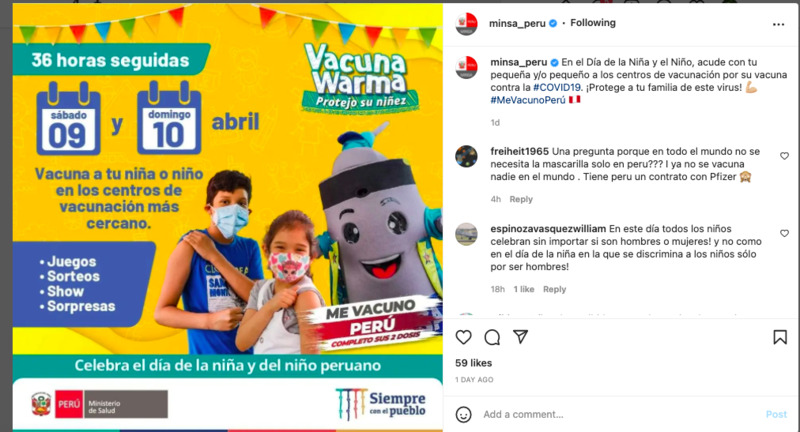
2022-04-10
En el Día de la Niña y el Niño, acude con tu pequeña y/o pequeño a los centros de vacunación por su vacuna contra la #COVID19. ¡Protege a tu familia de este virus! 💪🏼 #MeVacunoPerú 🇵🇪
A post by the Ministry of Health in Peru promoting the vaccination of children for the Day of the Child, it encourages people to go get vaccinated over the weekend.
-
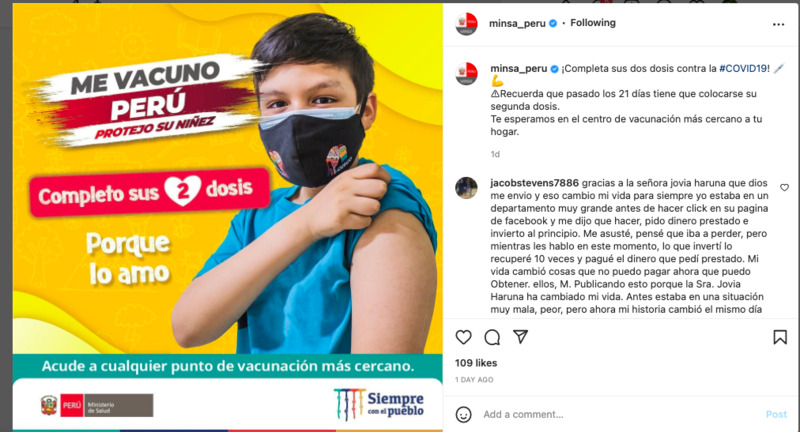
2022-04-10
This is an Instagram post by the Ministry of Health in Peru informing people to wait 21 days and then go get the second COVID-19 vaccine dose in the vaccination center closest to their home.
-
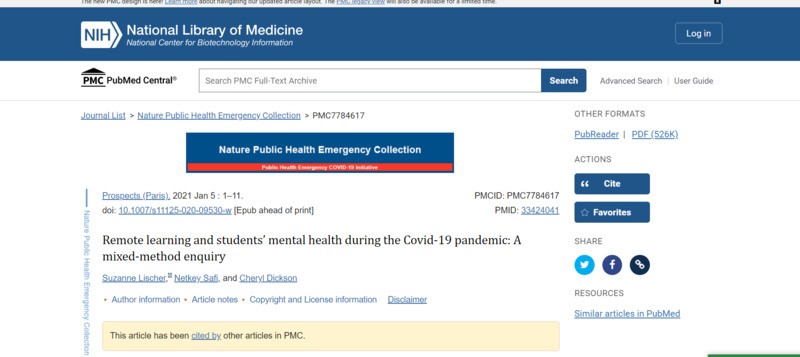
2021-01-05
The website that I am linking describes what happened to students all over the world in March of 2020 when all students in schools and universities had to go on lockdown and switch abruptly to complete online learning. This is an important covid-19 related topic to me because I was a senior in high school during that time, and I really struggled with my mental health, academic achievements, responsibilities, body image, and just overall my whole life. This article isn't as personal as it could get, but it gives a good historical and general idea of what student experience during the pandemic was like.
-
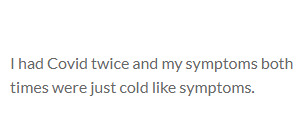
2022-04-10
I had Covid twice and my symptoms both times were just cold like symptoms.
-
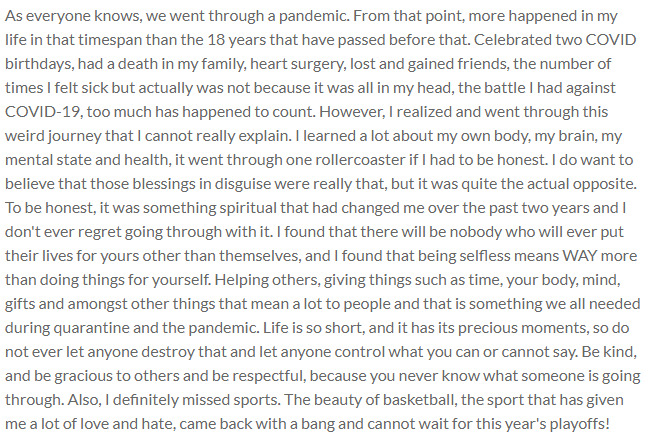
2022-04-10
As everyone knows, we went through a pandemic. From that point, more happened in my life in that timespan than the 18 years that have passed before that. Celebrated two COVID birthdays, had a death in my family, heart surgery, lost and gained friends, the number of times I felt sick but actually was not because it was all in my head, the battle I had against COVID-19, too much has happened to count. However, I realized and went through this weird journey that I cannot really explain. I learned a lot about my own body, my brain, my mental state and health, it went through one rollercoaster if I had to be honest. I do want to believe that those blessings in disguise were really that, but it was quite the actual opposite. To be honest, it was something spiritual that had changed me over the past two years and I don't ever regret going through with it. I found that there will be nobody who will ever put their lives for yours other than themselves, and I found that being selfless means WAY more than doing things for yourself. Helping others, giving things such as time, your body, mind, gifts and amongst other things that mean a lot to people and that is something we all needed during quarantine and the pandemic. Life is so short, and it has its precious moments, so do not ever let anyone destroy that and let anyone control what you can or cannot say. Be kind, and be gracious to others and be respectful, because you never know what someone is going through. Also, I definitely missed sports. The beauty of basketball, the sport that has given me a lot of love and hate, came back with a bang and cannot wait for this year's playoffs!
-
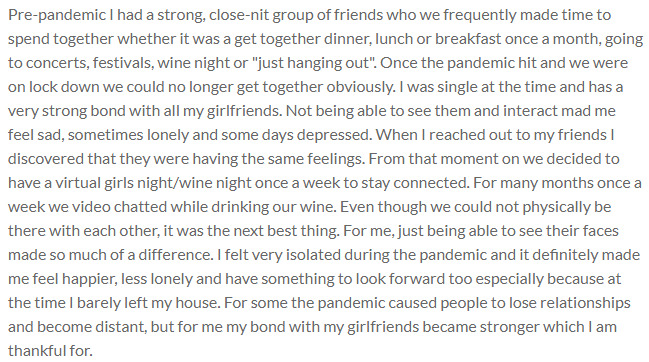
2022-04-10
Pre-pandemic I had a strong, close-nit group of friends who we frequently made time to spend together whether it was a get together dinner, lunch or breakfast once a month, going to concerts, festivals, wine night or "just hanging out". Once the pandemic hit and we were on lock down we could no longer get together obviously. I was single at the time and has a very strong bond with all my girlfriends. Not being able to see them and interact mad me feel sad, sometimes lonely and some days depressed. When I reached out to my friends I discovered that they were having the same feelings. From that moment on we decided to have a virtual girls night/wine night once a week to stay connected. For many months once a week we video chatted while drinking our wine. Even though we could not physically be there with each other, it was the next best thing. For me, just being able to see their faces made so much of a difference. I felt very isolated during the pandemic and it definitely made me feel happier, less lonely and have something to look forward too especially because at the time I barely left my house. For some the pandemic caused people to lose relationships and become distant, but for me my bond with my girlfriends became stronger which I am thankful for.
-
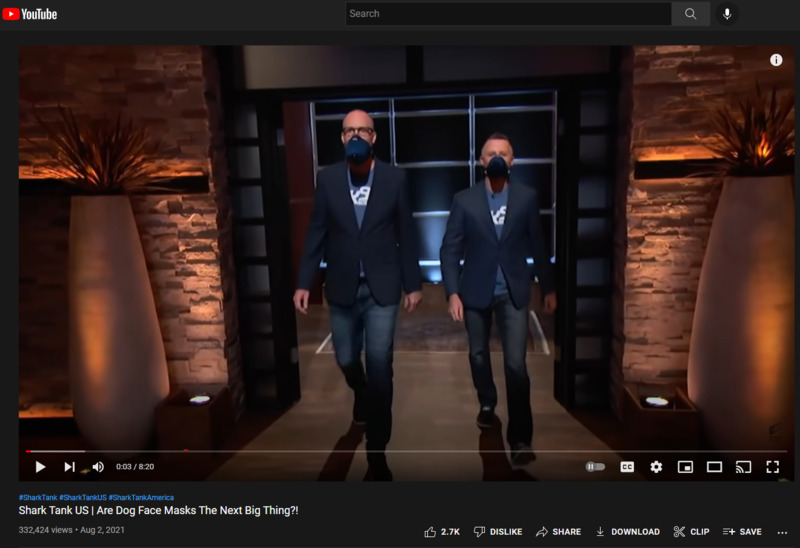
2021-08-02
This is a screenshot from season 12, episode 6 of Shark Tank. The screenshot shows Kirby Holmes enthusiastically showing off a picture of a dog wearing his and his cousin's product, K9 Masks. Their pitch to the Sharks goes like this:
Kirby Holmes: "we live in a time when people are questioning the quality of the air they breathe, with an increase in smoke from wildfires, dust storms, and oh yeah, the coronavirus!"
Evan Daugherty: "And while we've all gotten more comfortable wearing a filter mask to protect ourselves from air pollution and other threats, what about the ones we really love?"
Both: "Dogs!"
Even though this product's primary use is not for Covid, it still represents the lengths we went to protect our family members during these times. We all most likely participated in one of the following:
- Zoom call family holidays and parties
- Postponing weddings
- Staying inside
- Masking up ALL our family members...even the furry ones!
-
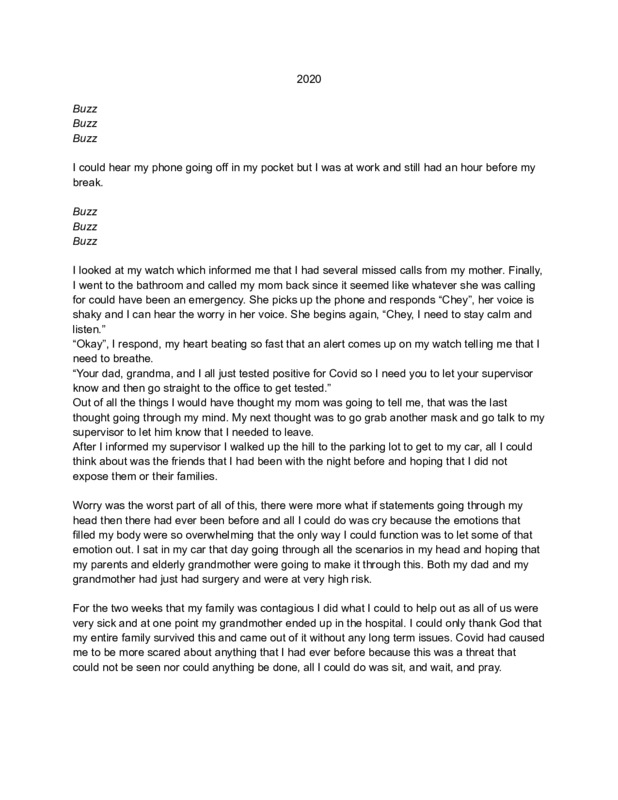
2020-06-21
This story shows my experience throughout the pandemic, it is important to me because it was an event that strongly impacted my life.
-
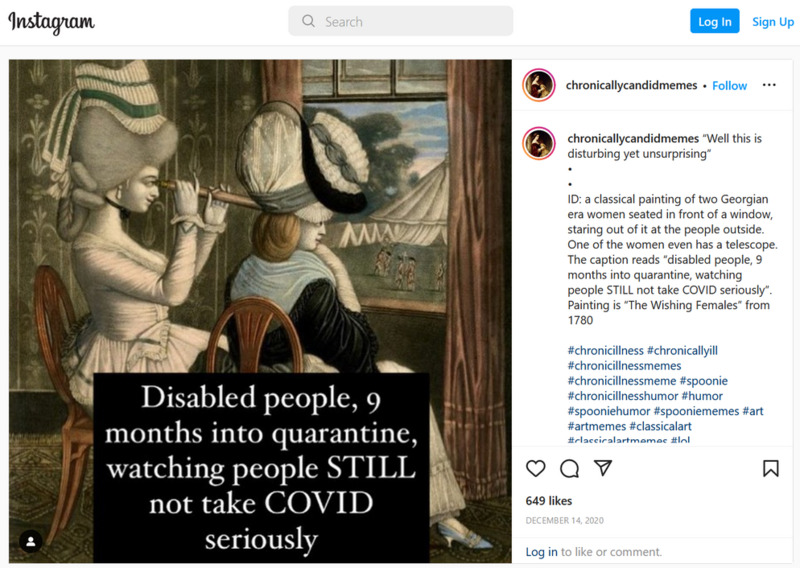
2022-04-09
Sometimes coping through humor is what gets us through.
-
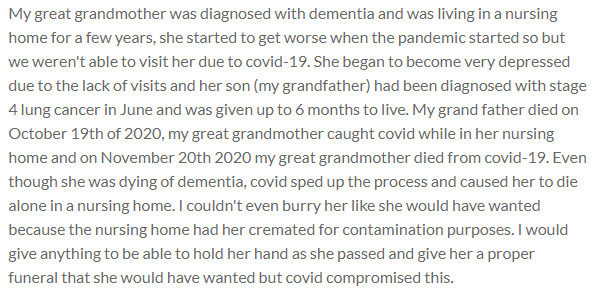
2022-04-09
My great grandmother was diagnosed with dementia and was living in a nursing home for a few years, she started to get worse when the pandemic started so but we weren't able to visit her due to covid-19. She began to become very depressed due to the lack of visits and her son (my grandfather) had been diagnosed with stage 4 lung cancer in June and was given up to 6 months to live. My grand father died on October 19th of 2020, my great grandmother caught covid while in her nursing home and on November 20th 2020 my great grandmother died from covid-19. Even though she was dying of dementia, covid sped up the process and caused her to die alone in a nursing home. I couldn't even burry her like she would have wanted because the nursing home had her cremated for contamination purposes. I would give anything to be able to hold her hand as she passed and give her a proper funeral that she would have wanted but covid compromised this.
-
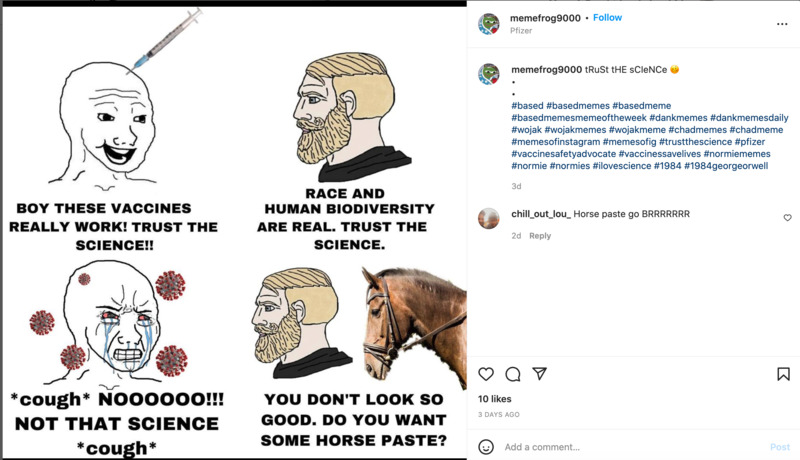
2022-04-04
This is an Instagram post by memefrog9000. This is another meme where it depicts a soy wojak (the wojak on the left) and the Chad wojak (the wojak on the right with the blond hair). This meme is making fun of people like the soy wojak that "trust the science", only later to get the virus despite getting vaccinated. The Chad wojak then suggests the soy wojak use some "horse paste" to help. "Horse paste" refers to Ivermectin, which is used to treat horses. There has been controversy if Ivermectin does treat COVID, or other things in humans for that matter, but the FDA currently recommends against it.
-

2022-04-04
This is an Instagram post by memefrog9000. This shows a meme of a communist getting mad at Wall Street for stealing money, but is okay with Pfizer making profits off of the vaccine, with the communist in the comic saying "Got my fourth Fauci-ouchy!! So glad all those anti-vax chuds are going to die!!" This meme is in the standard wojak format, and the wojak from the late 2010s to the current 2020s has been a popular meme format for certain groups. The wojak of the communist is meant to be depicted negatively because he has double standards on which corporations are allowed to profit.
-
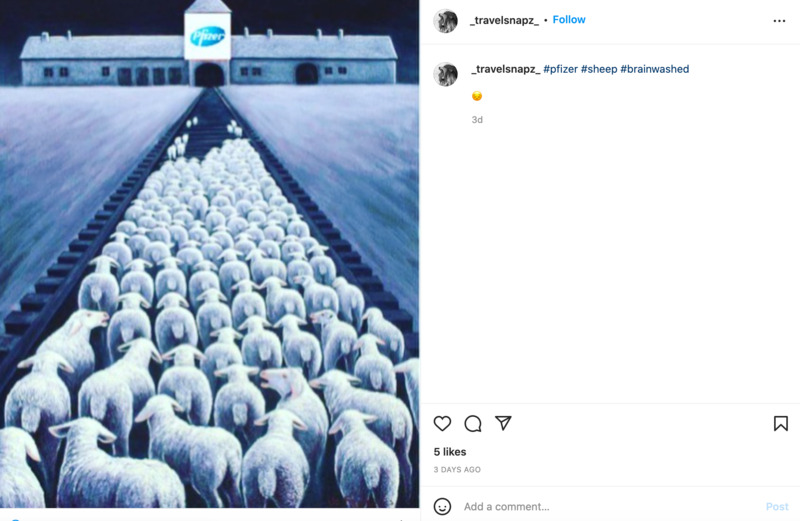
2022-04-04
This is an Instagram post from _travelsnapz_. This post shows a picture of a massive group of sheep being led to the slaughter, which is Pfizer. It is accusing people that get the vaccine that they are sheep and doing so because they cannot think for themselves.
-

2022-03-12
This is an Instagram post by wen_li0213. The kid in this picture has just gotten their first Pfizer dose, and one of the comments is saying that she is a "brave princess" for doing so.
-
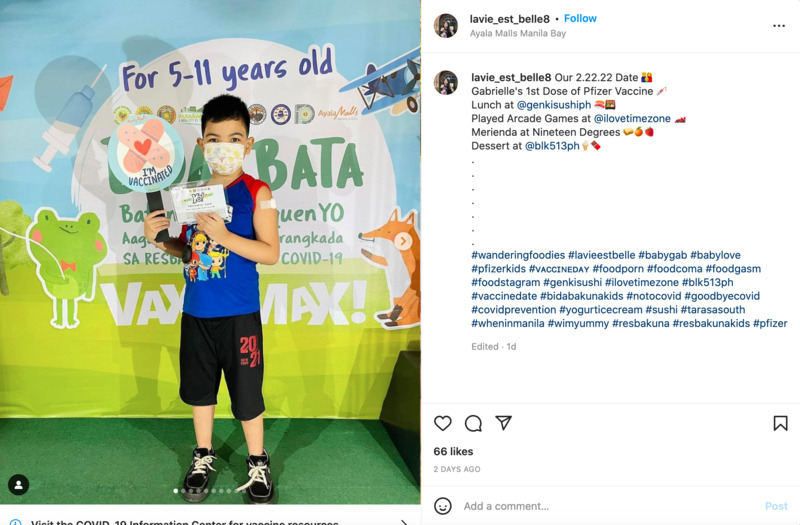
2022-04-05
This is an Instagram post by lavie_est_belle8. This is a post about Gabrielle getting his first COVID vaccine dose. Based on the caption, it looks like the parent/guardian planned a fun day with Gabrielle after getting the shot, including: out for sushi for lunch; games at the arcade; and out for dessert at the end. Gabrielle is standing in front of a backdrop and holding a "I'm Vaccinated" sign.
-
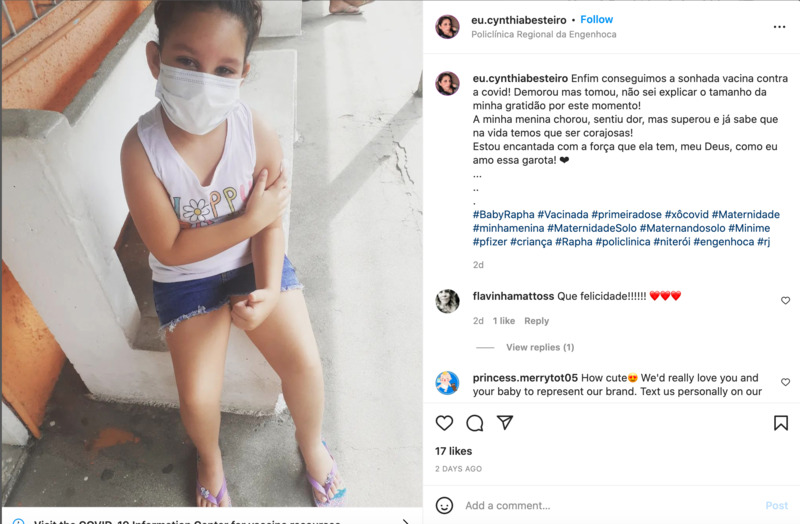
2022-04-05
This is an Instagram post by eu.cynthiabesteiro. This post is in Portuguese. It is about a kid that just got vaccinated. The caption is about the mother describing her gratitude for vaccines.
-
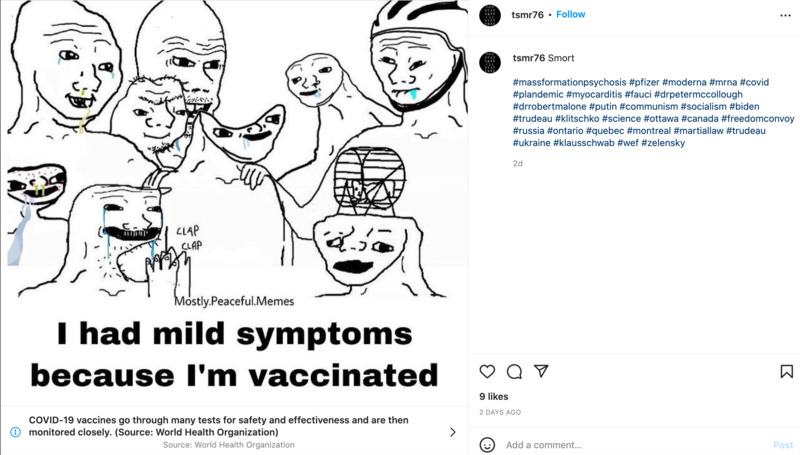
2022-04-05
This is an Instagram post by tsmr76. This post shows a meme making fun of people that have gotten fully vaccinated, only to later get COVID. It is meant to question the idea that the vaccines are effective. In one of the tags of this post, they mention "mass formation psychosis", which was a term coined by Dr. Robert Malone in an interview with Joe Rogan. The idea behind this term is that it refers to a mob mentality behind the vaccines, where people will essentially believe what they hear, repeat it, and get others to join in; which creates an environment where everyone seemingly agrees with each other. This creates a mob mentality towards those that think differently.
-
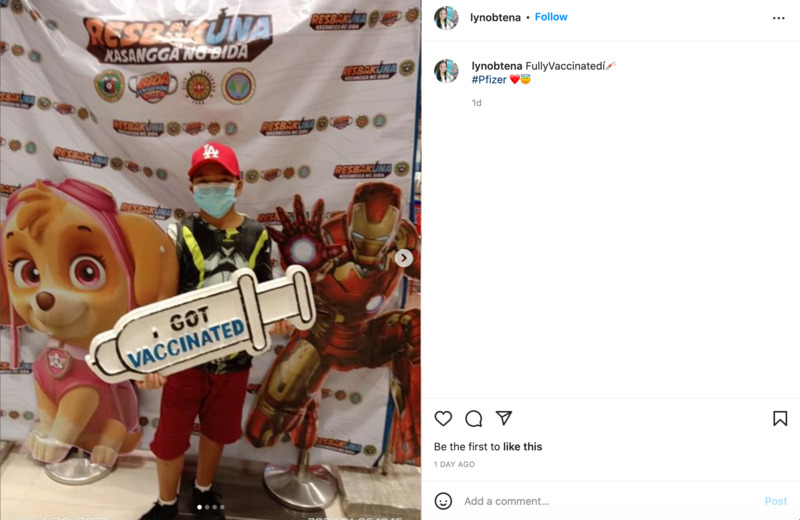
2022-04-06
This is an Instagram post by lynobtena. It shows a picture of a kid that had just received his second dose of Pfizer. There is a place for kids to get their picture taken after getting vaccinated, with cardboard cutouts of a Paw Patrol character and Iron Man.
-
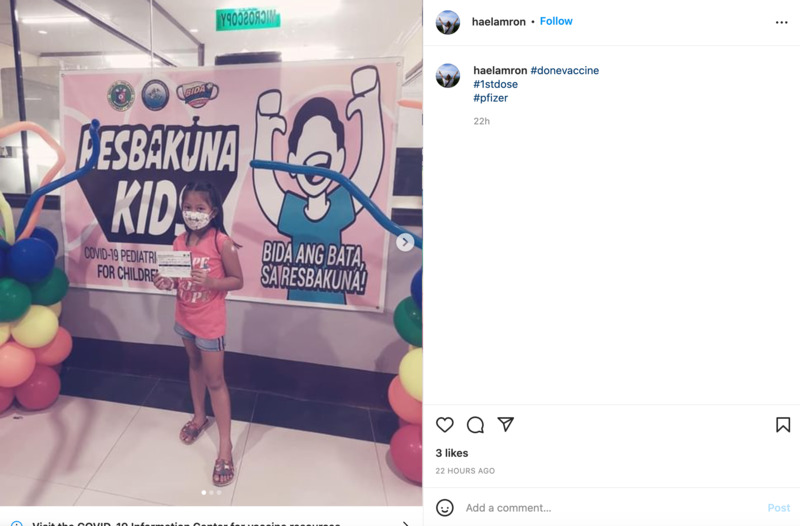
2022-04-07
This is an Instagram post by haelmron. This shows a picture of a little kid that had just received their first Pfizer dose. It looks like a special place was set up for kids to get their picture taken after getting vaccinated.
-
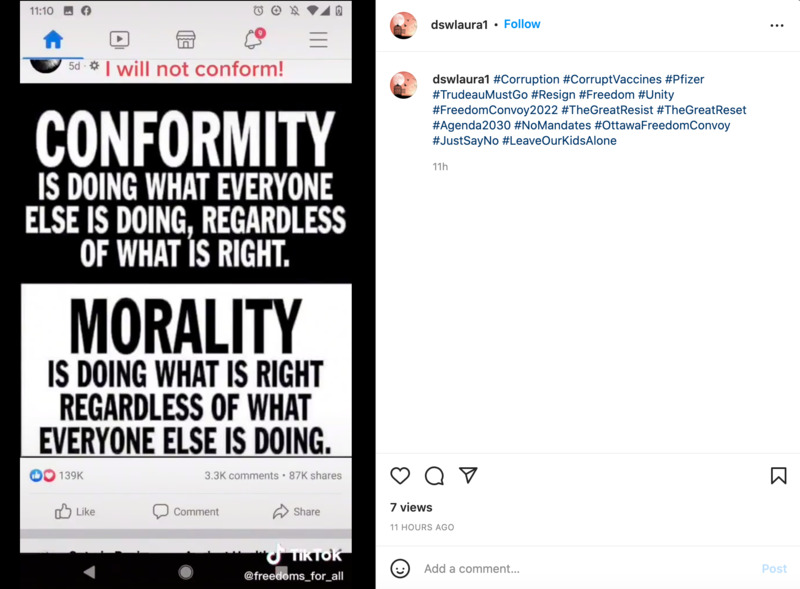
2022-04-07
This is an Instagram post by dswlaura1. This post shows a TikTok video, with hashtags as a description. The tags refer to things like the Ottawa Freedom Convoy, which has been a massive ongoing protest against vaccine mandates in Canada. Other tags include references to "The Great Reset", which is a conspiracy theory that the pandemic was created in order to make people more subservient to elites in power, while losing both their money and freedoms in the process. "Agenda 2030" is another conspiracy theory where it was established that 2030 will be the official "end" to the virus, along with other things.
-
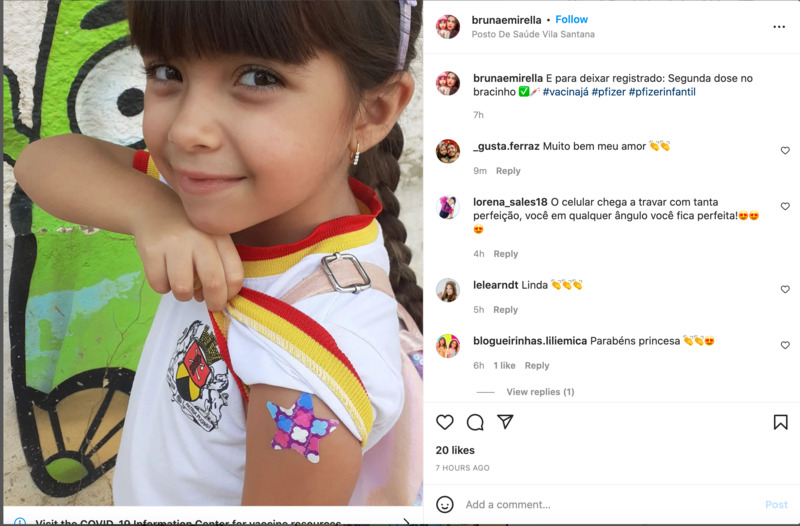
2022-04-07
This is an Instagram post by brunaemirella. This post is in Portuguese. This is a picture of a little girl that just received her second Pfizer dose.
-
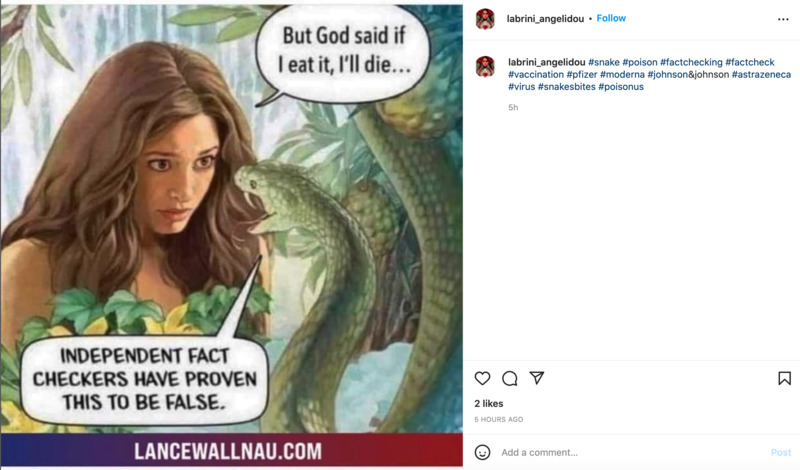
2022-04-07
This is an Instagram post by labrini_angelidou. This is a parody of the Adam and Eve story in the Bible, but it uses the fruit in place of the vaccine. The snake is representative of those encouraging you to take the vaccine, because the fact checkers have proven death from vaccines to be false. In the tags, many vaccines are listed, such as: Johnson and Johnson; Astrazeneca; Pfizer; and Moderna.
-
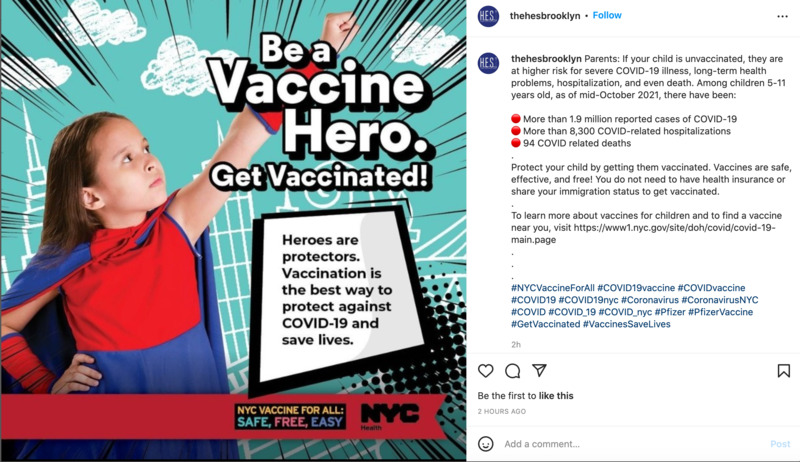
2022-04-07
This is an Instagram post by thehesbrooklyn. This is a post encouraging children to get vaccinated. This post has a link to the New York City government website on more information on COVID. The picture shows a little girl dressed as a super hero as part of the PSA.
-
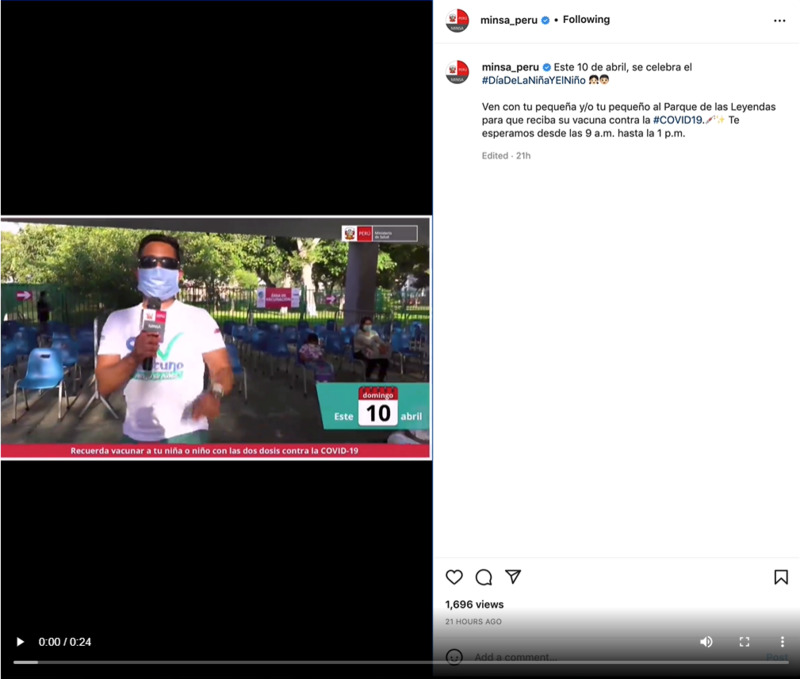
2022-04-07
This is a video posted on Instagram by the Ministry of Health in Peru promoting the vaccination of children in Peru. On Sunday there will be an event at a public park where children can come and get the vaccine.
-

2021-05-29
I chose to submit this photo because this is the first picture I took of my graduation -- after spending a year and a half in online schooling. I do remember my in-person schooling, but once everything shut down and my life completely changed, I was lost and had no idea how to handle things. I fell out with lots of friends because I didn't see them as much anymore. It became difficult to communicate with people because I spent most of my time indoors, trying to keep myself and my family safe from COVID-19. I lost interest in my hobbies and in school -- nothing felt worth it anymore because we were all trapped inside, and when we went outside, masks were required to keep us safe. I couldn't see people's faces anymore. Things didn't look positive -- I wasn't sure if anything would ever change. I worried we would be isolating for many more months, possibly years to come. But for some reason, graduation felt liberating. I remember walking out of the arena after graduating and thinking, "Okay, this is a new start." I knew things would not change immediately, and they would take time. But I felt that life goes on, and I will learn to get through this, just as I got through those times where I was isolated. I learned to appreciate the people I had around me, become closer with those who really mattered, and just appreciate daily life because at any moment, everything can change.
-
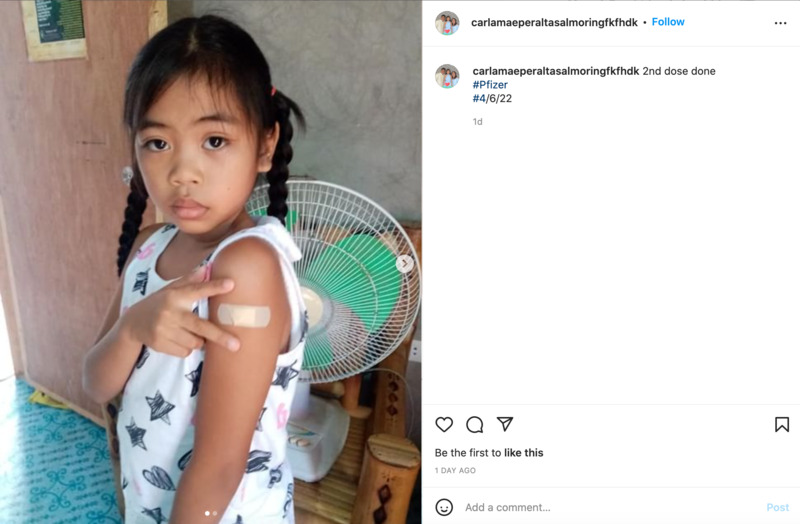
2022-04-06
This is an Instagram post by carlamaeperaltasalmoringfkfhdk. This picture shows a kid that just got their second dose of the Pfizer vaccine. The date says that the shot happened on April 6, 2022.
-
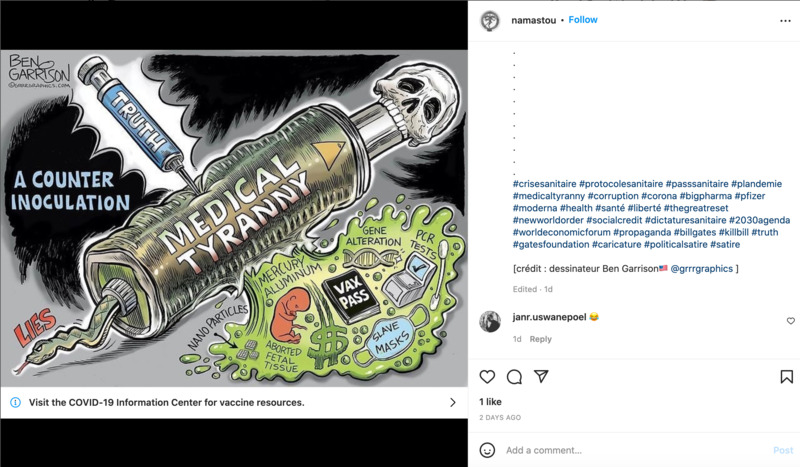
2022-04-05
This is an Instagram post by namastou, and is partly in French. The comic posted in addition to the caption is by Ben Garrison, a political comic artist based in the United States. The comic shows how "truth" is being injected into "medical tyranny", and with that, the truth is that the masks are akin to making you slaves to the government, the vaccines cause gene alteration, and that PCR tests can come out as a false positive.
-
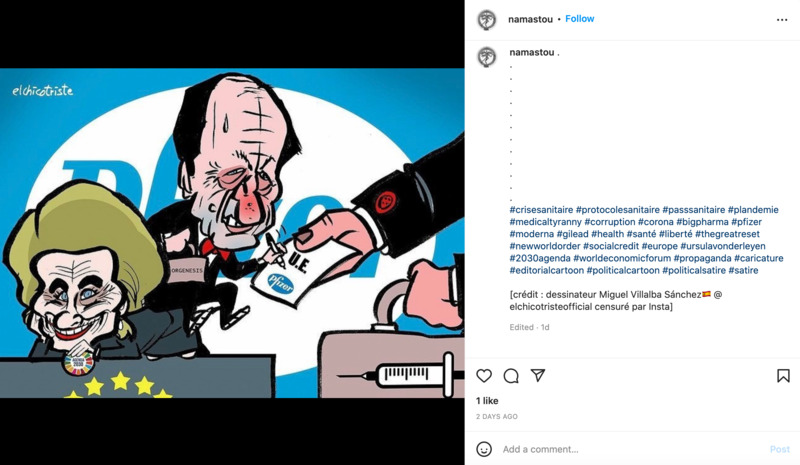
2022-04-05
This is an Instagram post by namastou. This post is partly in French. The picture depicted are people part of the European Union signing a deal with Pfizer, one of the vaccine producers. The 2030 Agenda that is referenced is about the year 2030 being the year all the problems COVID has caused will be solved. An article is linked to this post in order to give more context to the 2030 Agenda and what it means for this comic. The conspiracy theories surrounding the 2030 Agenda also have to do with the New World Order, which has been a long-standing conspiracy theory even before the pandemic happened.
-
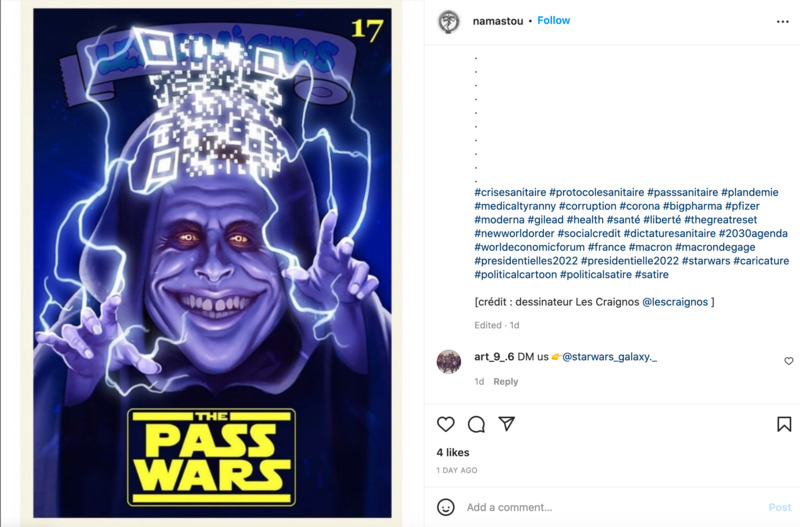
2022-04-06
This is an Instagram post by namastou. This post is partly in French, and it is a satire on Star Wars. The post references President Emanuel Macron, the current French president in the tags. It also uses the tag #plandemie, which is a French way of saying "plandemic", which is the belief that this pandemic was planned out by the rich in order to get richer and control their populace. They also say #liberté, or "liberty", possibly referring to their side being the side of freedom. #thegreatreset is another tag that is about the pandemic triggering a "great reset" where the rich have almost near control of the population through things like vaccine passports, which would limit freedom of movement if some refused to get the vaccine, thus creating discrimination between the vaccinated and unvaccinated.
-

2022-04-06
This is an Instagram post by 4kron2. This user posted few tags, but the picture does give a lot of information. There has been a controversy on if booster shots are even needed, with some believing that this is a ploy by Big Pharma to get more money from the pandemic. This picture is a parody of loyalty cards some places have where if you buy a certain product or service enough times, you will get a reward.
-
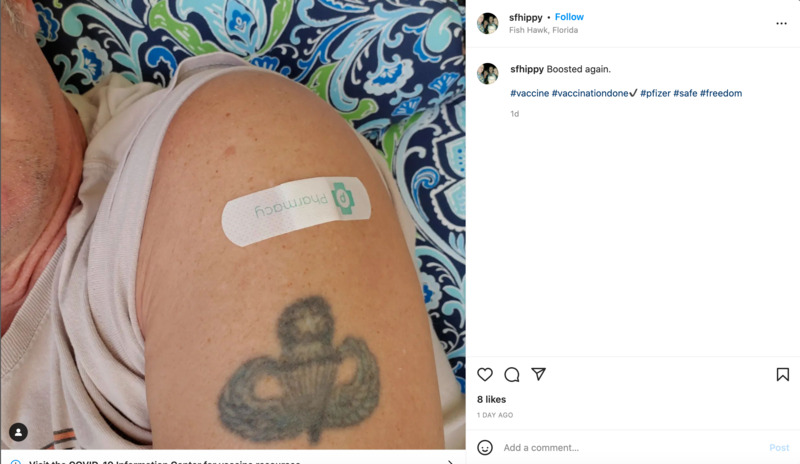
2022-04-06
This is an Instagram post by sfhippy. This post is a selfie of someone who just got boosted with pfizer. Pfizer is one of the vaccines approved for boosters. The user used #safe, which I am going to guess that they believe the vaccine will make them safer than before.
-
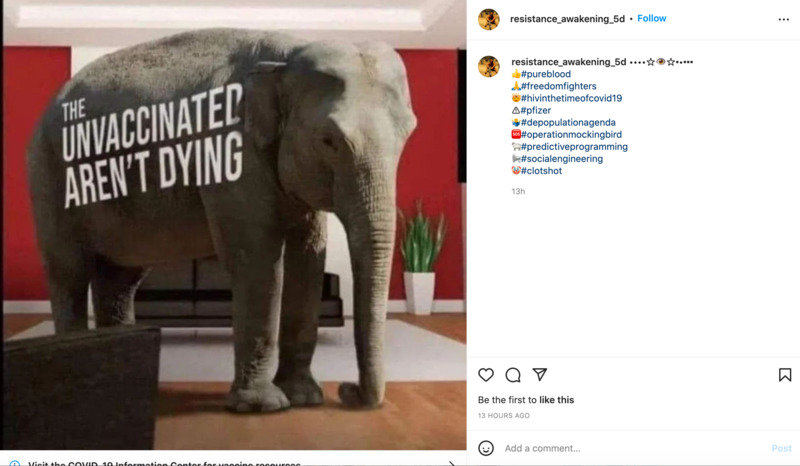
2022-04-07
This is an Instagram post by resistance_awakening_5d. This user posted a picture in reference to the "elephant in the room" regarding vaccines. This being that the unvaccinated are not dying. The user added tags like #pureblood, which means someone that has not gotten the vaccine, and is therefore "pure." Other tags include #depopulationagenda, which references the idea that the vaccines are meant to depopulate the world. #clotshot refers to the user believing the vaccines cause blood clots. These are just a few meanings of the tags used by the author of this post.
-
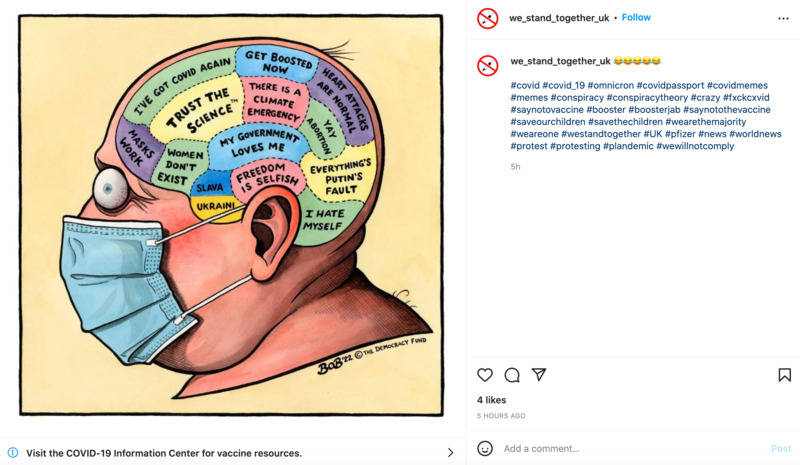
2022-04-07
This is an Instagram post by we_stand_together_uk. The post shows a comic of a man and his brain full of different narratives, with the man looking fearful. Quite a few of the narratives depicted are COVID related, such as: "masks work", "trust the science", and "get boosted now." The poster themselves in the tags says #saynotothevaccine and #wewillnotcomply, making me believe that they think that everyone that has taken the vaccine has been brainwashed in some way to accept it, when they believe it is dangerous.
-
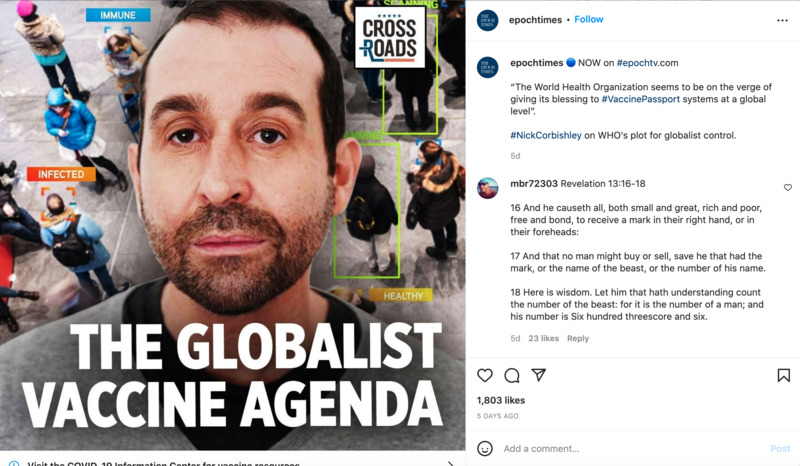
2022-04-02
This is an Instagram post by epochtimes. The Epoch Times is a news organization. According to this post, it says that the vaccine passports are ways to limit freedom from government leaders. From my own experience with these arguments, a lot of it is not based on the vaccines themselves, but the fear of less rights to movement and more government spying. The vaccine passports would just be a way for the government to exert more control over the populace, using vaccines and public health as a facade to that. When I was searching for items to add, I used the #vaccine to find this. Noticeably, I had to click past a few things to even look under this hashtag, and it didn't allow me to see past a few posts, as Instagram has blocked from view many of the search results that come from this hashtag in particular. This was one of the few posts Instagram allowed me to see.
-
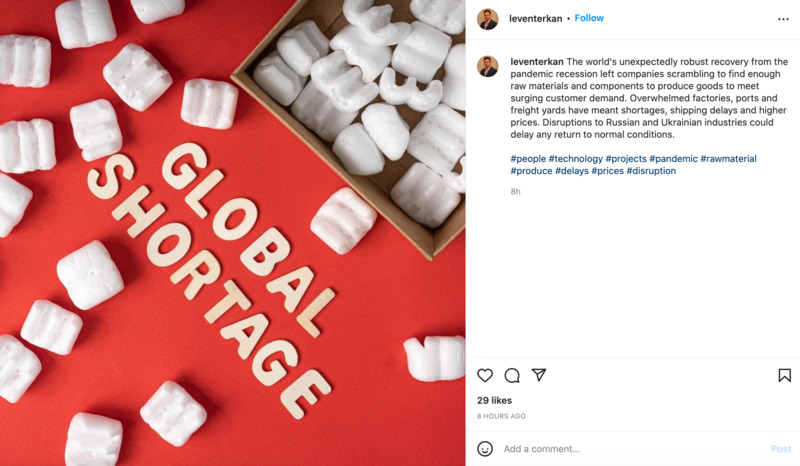
2022-04-07
This is an Instagram post by leventerkan. This user brings up the problems with shortages of raw materials as a result of the pandemic. Due to these shortages, prices of items have also been rising, leading to more inflation. At the end, it talks about how the war between Russia and Ukraine is making the supply chain issues even worse, as it is freezing up some industry, which could delay any return to normal conditions.
-
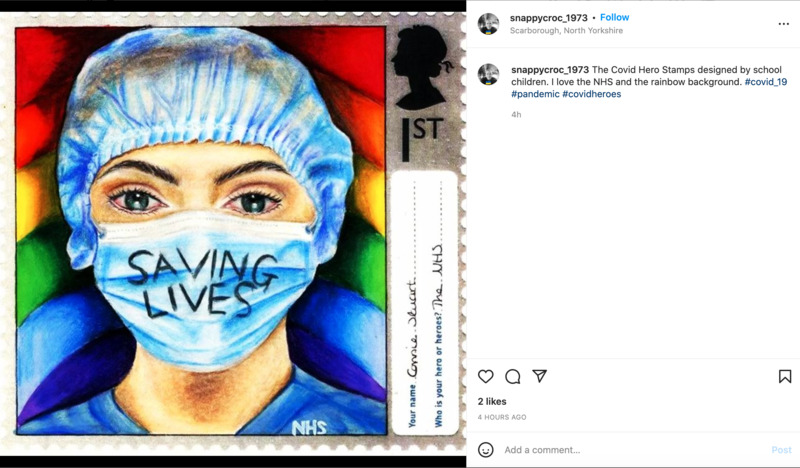
2022-04-07
This is an Instagram post by snappycroc_1973. This user posted a picture of one of the COVID Hero Stamps designed by school children. These stamps are meant to support the NHS (National Health Service), which is based in the United Kingdom.
-
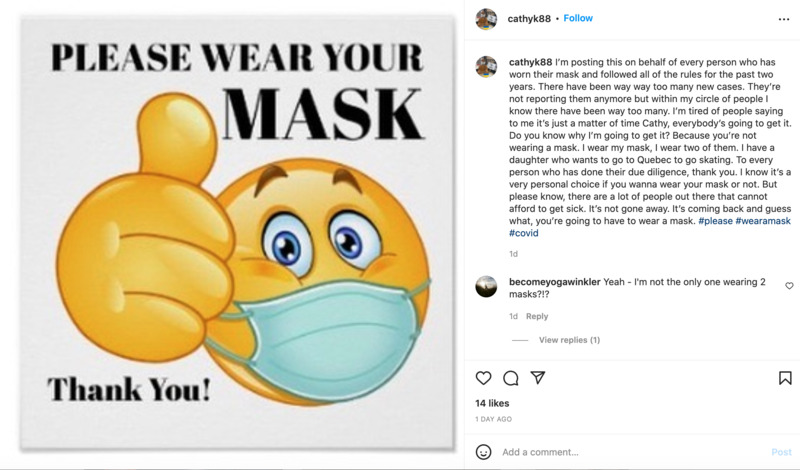
2022-04-06
This is an Instagram post by cathyk88. This user is posting on behalf of everyone that has followed the rules regarding masking these past two years. This user says that while new cases are not being reported by the media, this user is still keeping up with them. They say at the end that it is a personal choice of whether to wear a mask or not, there are a lot of people that cannot afford to get sick. At the end, they conclude that COVID is making a comeback and that people should mask up more.
-
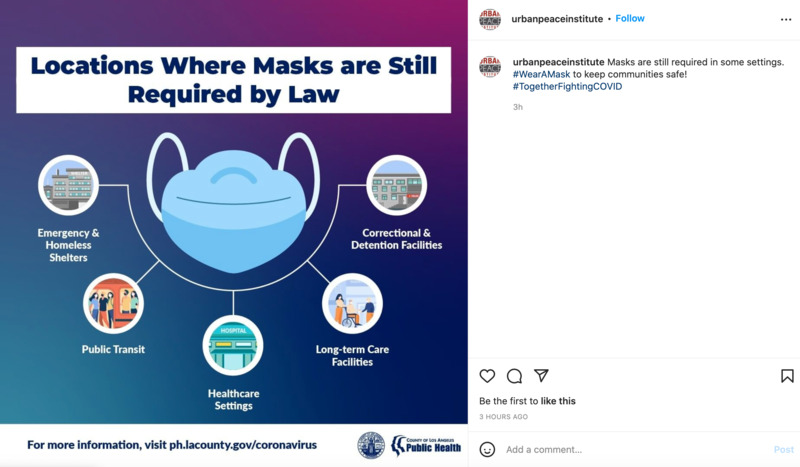
2022-04-07
This is an Instagram post by urbanpeaceinstitute. This post refers to places where mask mandates are still in existence. Even though mask mandates have been lifting in many places, certain places still want masks. Some of these places include: emergency and homeless shelters; public transit; healthcare settings; long-term care facilities; and correctional and detention facilities. These places are either government or healthcare associated. This post links to the County of Los Angeles Public Health for more information on the Coronavirus.
-
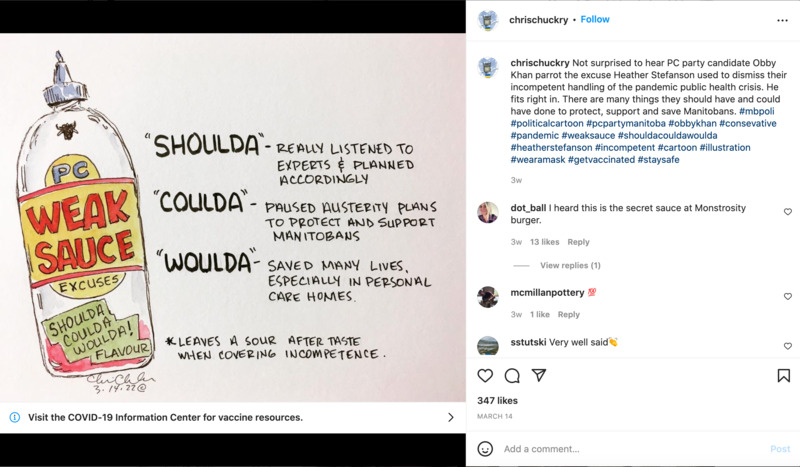
2022-03-14
This is an Instagram post by chrischuckry and it is a political comic on the incompetence on part of the Canadian government and the handling of the pandemic. Obby Khan, who is referenced in this post, is a Pakistani-Canadian politician. This user is accusing him of using the same excuses as Heather Stefanson, who is the premier of Manitoba, a Canadian province. The political comic is upset about politicians in Manitoba "not listening to experts" and allowing the pandemic to become more dangerous.
-
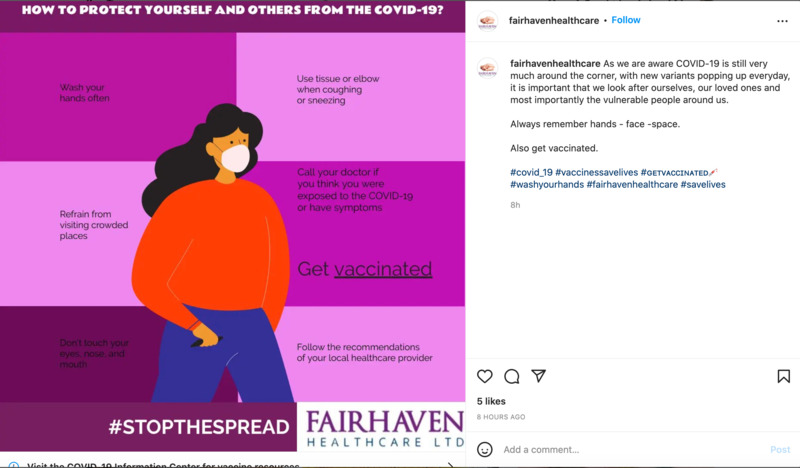
2022-04-07
This is an infographic on Instagram posted by fairhavenhealthcare. This infographic advises people to: use tissues when sneezing or coughing; wash hands often; refrain from crowded places; not to touch hands, mouth, or eyes; follow recommendations from healthcare providers; and get vaccinated.
-
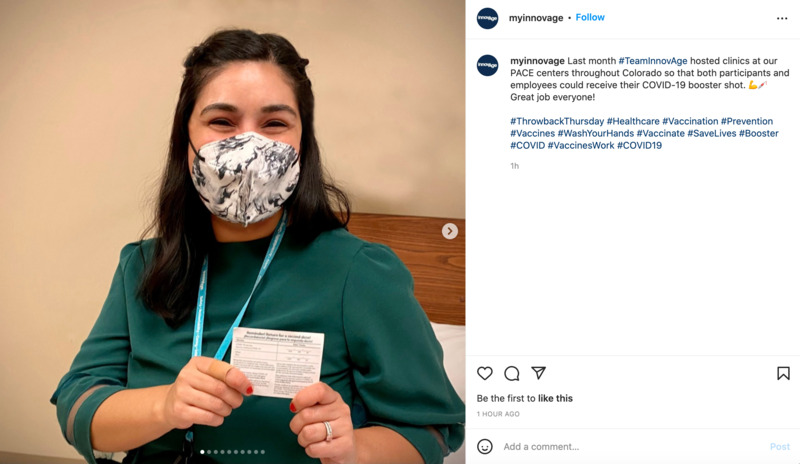
2022-04-07
This is an Instagram post from myinnovage. This is a team that worked on getting people vaccinated. Here, one of the pictures that was chosen was of a woman holding a blank vaccine card and wearing a mask. This team is in Colorado and is encouraging people to get their booster shots.
-
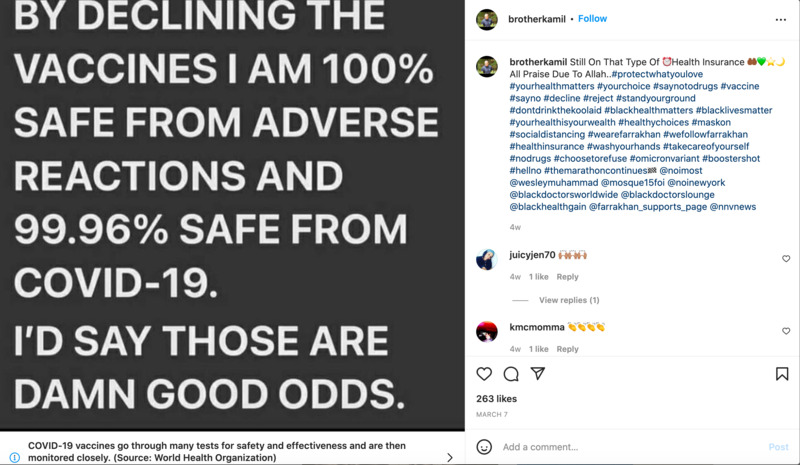
2022-03-07
This is an Instagram post from brotherkamil. This user is posting their skepticism surrounding the vaccine, believing that it will cause ill health effects. By abstaining from the vaccine, the user says that they are 100% safe from averse reactions.
-
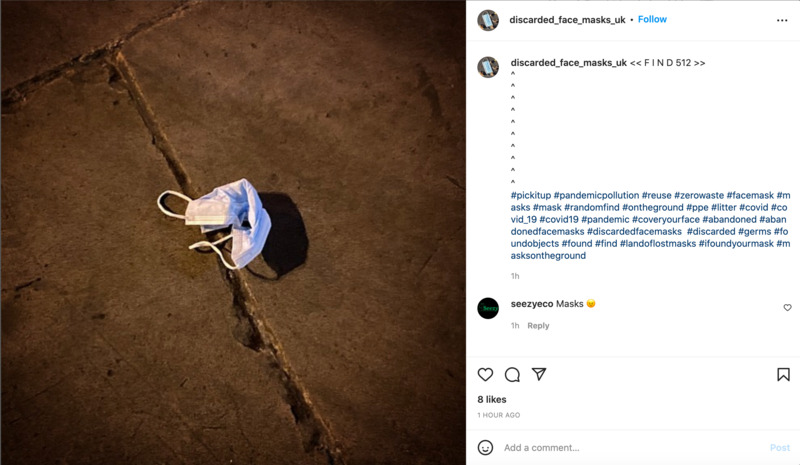
2022-04-07
This is an Instagram post by discarded_face_masks_uk. This is an account that shows people that have left their face masks on the ground, thus making it worse for the environment. Hashtags like #coveryourface do imply that they still want you to wear a mask, but are against people accidentally leaving them on the ground. This helps speak of a larger issue where with mask mandates in places in some areas, it leaves more opportunity for people to litter with their face masks, as people will take them off at times when doing certain tasks or if they think they don't need one in some specific area.
-
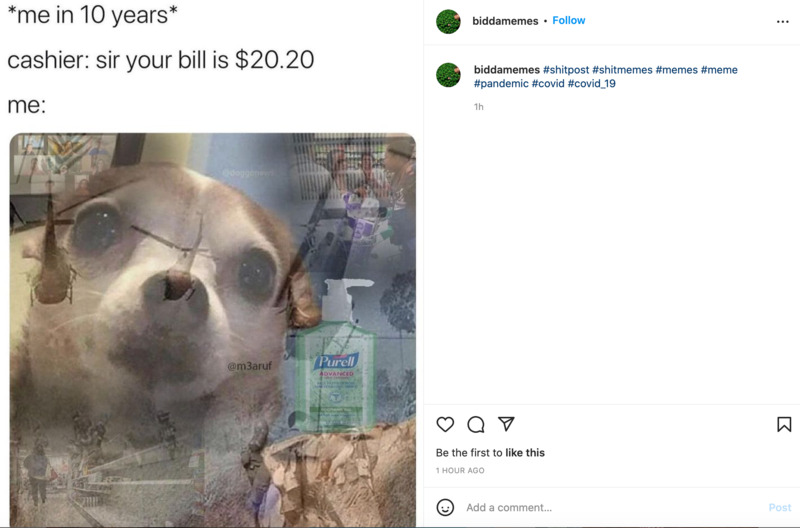
2022-04-07
This is a meme found on Instagram from biddamemes. This meme depicts how someone would feel 10 years from now and being reminded of 2020 in small ways. The items in the flashback are very relevant, as hand sanitizer had major shortages in 2020, with some places putting a cap on how much people could buy at one time. It also shows things like empty shelves, which did happen at the very beginning of 2020 with people panic buying. One of the most panic bought items was toilet paper, and companies that produced toilet paper could not keep up with the amount of panic buyers, so for a few months, nicer toilet paper was harder to come by.
-
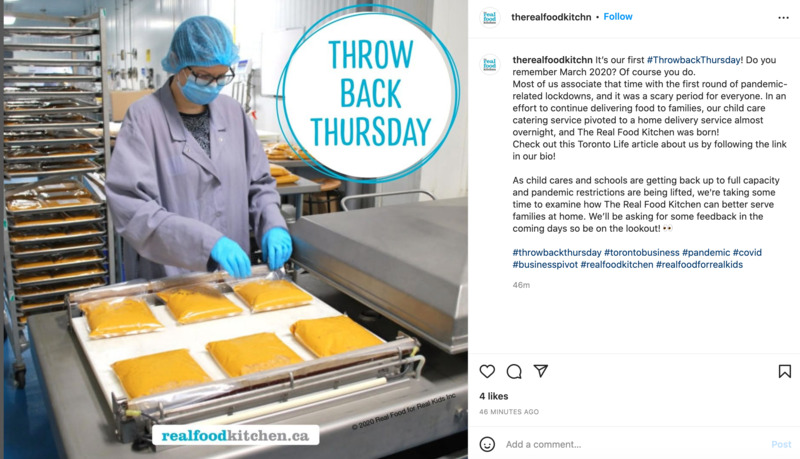
2022-04-07
This is an Instagram post from therealfoodkitchn, which made efforts to deliver food to families and kids in need during the pandemic. Currently, this place is looking on how to better serve families now that things are opening up more.
-
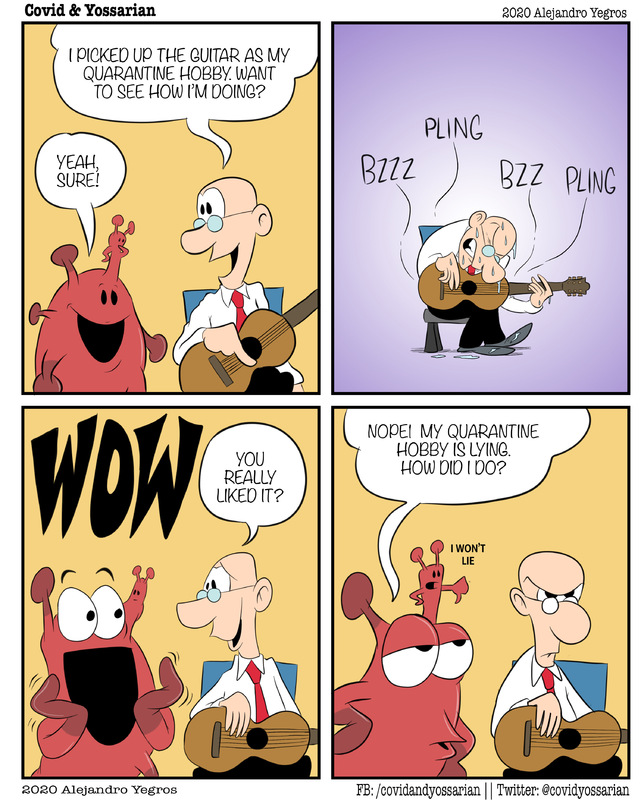
2020-06-13
Covid and Yossarian Episode 88, Covid and Yossarian Episode 8
-
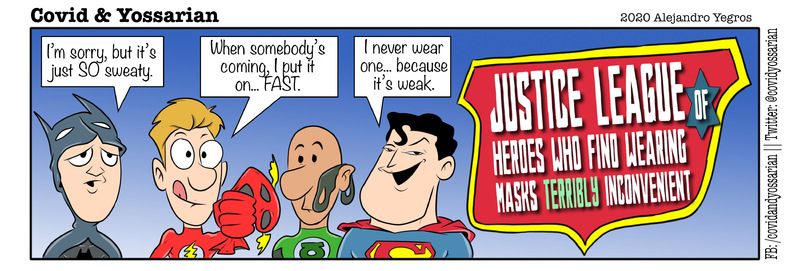
2020-06-12
A comic strip about Covid-19
-

2020-06-11
A comic strip about Covid-19
-
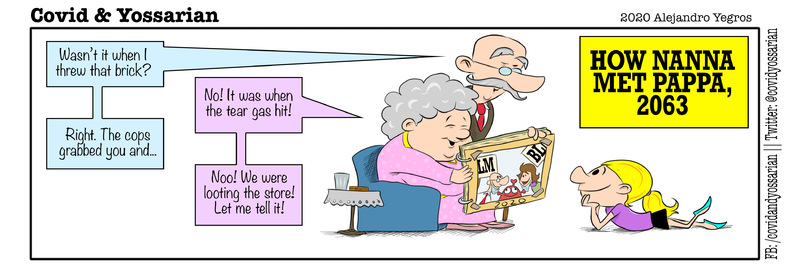
2020-06-10
A comic strip about Covid-19
-
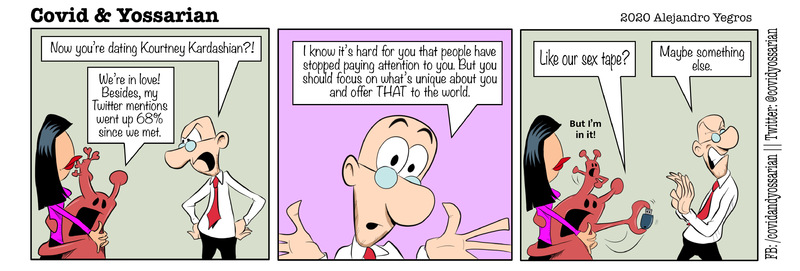
2020-06-09
A comic strip about Covid-19
 2022-04-10
2022-04-10 2022-04-10
2022-04-10 2021-01-05
2021-01-05 2022-04-10
2022-04-10 2022-04-10
2022-04-10 2022-04-10
2022-04-10 2021-08-02
2021-08-02 2020-06-21
2020-06-21 2022-04-09
2022-04-09 2022-04-09
2022-04-09 2022-04-04
2022-04-04 2022-04-04
2022-04-04 2022-04-04
2022-04-04 2022-03-12
2022-03-12 2022-04-05
2022-04-05 2022-04-05
2022-04-05 2022-04-05
2022-04-05 2022-04-06
2022-04-06 2022-04-07
2022-04-07 2022-04-07
2022-04-07 2022-04-07
2022-04-07 2022-04-07
2022-04-07 2022-04-07
2022-04-07 2022-04-07
2022-04-07 2021-05-29
2021-05-29 2022-04-06
2022-04-06 2022-04-05
2022-04-05 2022-04-05
2022-04-05 2022-04-06
2022-04-06 2022-04-06
2022-04-06 2022-04-06
2022-04-06 2022-04-07
2022-04-07 2022-04-07
2022-04-07 2022-04-02
2022-04-02 2022-04-07
2022-04-07 2022-04-07
2022-04-07 2022-04-06
2022-04-06 2022-04-07
2022-04-07 2022-03-14
2022-03-14 2022-04-07
2022-04-07 2022-04-07
2022-04-07 2022-03-07
2022-03-07 2022-04-07
2022-04-07 2022-04-07
2022-04-07 2022-04-07
2022-04-07 2020-06-13
2020-06-13 2020-06-12
2020-06-12 2020-06-11
2020-06-11 2020-06-10
2020-06-10 2020-06-09
2020-06-09